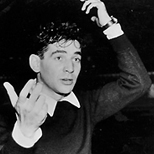
I have always held a certain ambivalence toward my nation’s national anthem. For my parents’ generation, having participated in a war for our nation’s survival, it is a deep and important talisman. But to my generation, its theme (war) places it at the center of an unresolved struggle, making it an uncomfortable national icon. It’s not entirely clear what we’re celebrating when we stand respectfully at the start of baseball games, but the ritual has always made me uncomfortable.
Yesterday on the radio, though, I heard the most remarkable and stirring version of the song. Performance Today, the wonderful classical music program on public radio, set it up thus: A tape of a radio announcer telling his audience that the New York Philharmonic’s regular conductor was ill, and the orchestra would be led that day by his assistant, Leonard Bernstein. It was November 1943, the darkest heart of the war, and we were hearing the debut of that most American of artists, leading the Philharmonic in the National Anthem. You can hear the audience singing along – badly, as audiences always do, lagging the orchestra slightly, but there’s an energy to the thing that is palpable, as if the singing of this song matters in a way that my generation could not possibly understand.
To listen: Performance Today – click on Hour 1 at the top of the page, the segment starts at 14 minutes in

As for myself, I have always been partial to America the Beautiful both the original and the Ray Charles versions, and Kate Smith singing God Bless America, esp. before a Flyers game. However if you want stirring in a national anthem, it is hard to beat La Marseillaise
Thanks for this post, there are a lot of good versions of all of these and more on You Tube.
Last night, by coincidence, Casablanca was on the telly. It’s one of those movies that keeps offering up a new example of “my favorite scene”, but one for sure is Victor Laszlo leading the singing of Le Marseillaise. And it is, again, an example of the strength drawing from the moment in time: singing that song in 1942 meant something very special that’s hard to imagine today.